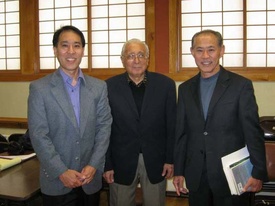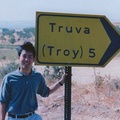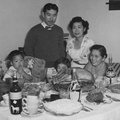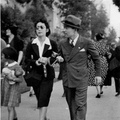I always liked interviewing people. I learned so much more than I could ever imagine, whether for an informational interview or for graduate school research. Most of the interviews I did in the past, I was contextualized to that person and hopefully that person also knew a little something about me, and hence the interviews came easy and flowed. Fortunately, this would also include my latest interview featuring Frank F. Chuman.

From Left to Right: Troy Ishikawa, Frank Chuman, and Dale Minami. Photo taken at the Japanese Cultural and Community Center of Northern California, San Francisco, CA, July 24, 2011
Frank befriended me through Tim Asamen, the newsletter editor for the Kagoshima Heritage Club. Tim introduced me to Frank via email addresses because he knew our immediate ancestors came from the same city in Japan—Kokubu. Prior to interviewing Frank, we exchanged a couple of email messages over the past year.
I learned that he was a retired civil rights attorney who practiced in Los Angeles and that he wrote his first book, The Bamboo People: The Law and the Japanese Americans, in the 1970s. I read his first book, early in 2011. What impressed me most was his high-level scholarship; the research of cases that involved Japanese Americans legal issues were very thorough and reading them didn’t cause confusion or feeling overly weighted down by convoluted jargon. Besides, I was learning some details of Japanese American history.
Frank most recently published his memoirs, Manzanar and Beyond: Memoirs of Frank F. Chuman, Nisei Attorney. I read his latest book prior to interviewing Frank. I felt compelled to ask him questions that he either didn’t write about or to ask follow up questions, without giving specific details from his memoirs. Myself being trained as an Interculturalist, I was interested in possibly learning Frank’s take on Thai and Japanese Americans, but before settling into this question I asked about his life in Bangkok, Thailand.
How is your life in Bangkok, Thailand? Or How long have you been living there?
[NOTE: Frank chuckled after hearing the first part of the question.]
Frank: I’ve been living there, seven years now, since I have retired from the practice of law in the United States after sixty years of practice. My wife was born in Thailand, although she was educated in the United States and I met her inside the United States, and I married her in the United States, but after sixty years when I decided to retire, we decided to go to Bangkok, where she had a home.
She completely took down the home that she had been living in with her family: father and mother, sisters. And she, herself redesigned the house which we’re now living in. We’ve lived in the house for the past two and half years.
To go further, I like Thailand, although unfortunately, I don’t really speak the language or can read the letters. But I like the Thai food.
I hope that Frank’s chuckling was due to him being surprised at the question and not something else. I didn’t bother to ask him. Frank delivered the prologue to my next question about his favorite foods.
Frank: Well, the Japanese food that I eat in the different restaurants is mostly sashimi which includes my favorite restaurant, ‘Zen’ which serves great hammachi. And the hammachi food is served so thick and so sweet and juicy. I like to go there as often as possible. But the, Thai food is very good.
Unfortunately, I didn’t ask a follow up question as to his favorite Thai foods. (He may not have known the names of these foods.) I also wanted to know Frank’s impressions of Thai people compared to Japanese Americans. I didn’t dig very deeply and Frank gave me his take.
How similar are Thais to Japanese Americans? In terms of the culture, their values, behaviors, and their norms.
Frank: I don’t think there are any difference. They’re all nice people. Just like the Japanese. Each individual when it comes to it is the individual who is compatible to us or are not compatible to us.
I guess I’m trying to look at the whole group, if you were to compare them. Are there any similarities to their cultures?
Frank: Well, in terms of their culture. I observed they are, that the Thai people, in general and in their daily practice are very conscious of being Buddhist in religion. And they observe the ceremonies, the customs, and the practices of Buddhism very very conscientiously.
I used to visit and worship at the Anglican churches when we lived in the heart of Bangkok. There’s only a few Anglican churches in the whole country of Thailand and there were two or three in Bangkok. But the... they were Thais who were worshiping according to the Anglican custom. And the, so when we left and went to Taling Chan, of course I didn’t maintain my connections with the Anglican church and I have not been to an Anglican church, since we moved to Taling Chan.
Frank seemed very comfortable sharing his observation about Thai’s and Buddhism. I’m not surprised that he was so direct and forthcoming about talking about religion. A person who has a belief system would probably notice others’s religion and also want to share this sometime hidden fact about oneself.
This last question addresses Frank’s second book, Manzanar and Beyond. I asked,
In your book, Manzanar and Beyond: Memoirs of Frank F. Chuman, Nisei Attorney, what incident do you hold as near and dear?
Frank: Well, I think it was my suggestion for somebody to attack the Korematsu, Yasui, and Hirabayashi case with this Writ of Error Coram Nobis. I had learned this in 1944, ’45 when I was a student at the University of Maryland Law School. In a course on Equity that was taught by Dean Roger Howell. He talked about the old common law, Writ of Error Coram Nobis part of the Chancery court which is presided over by religious people as contrasted by the law courts, which handle the civil cases... [I]t’s an extraordinary writ they call not in the course of ordinary controversy...
As to somebody who knew about Writ of Error Coram Nobis and this is only my guess that when this commission came into Boston, Professor Peter Irons who was professor at University of Massachusetts was at the hearing and I’m not too sure if he knew about it before hand or he knew it when one of the commission members probably Judge [William] Marutani [of Philadelphia] asked the audience does anybody know about this Writ of Error Coram Nobis and either Peter Irons knew about it or he became interested in it and he contacted Dale Minami and Dale Minami became the lead attorney for about twenty-four attorneys who decided they would check into whether or not this Writ of Error Coram Nobis was possible for these cases and then Peter Irons involved in researching the facts in the government Freedom of Information Act and supplied us with the information to successfully attack these decisions: one in the Federal District Court in San Francisco and the other in Portland, Oregon, and the other one in Seattle, Washington. It was successful and I give credit for the leadership to Dale Minami and also to Peter Irons for bringing it together into a mobilized army of twenty-four lawyers to attack these cases.
Reading and later hearing the story about Writ of Error Coram Nobis from Frank, both excited and fascinated my sense of justice. Most likely, the team effort to win these criminal cases provided a legal foundation for the Japanese American community who were imprisoned during WWII (my family included) and unjustly sent to America’s concentration camps without due process and decades later were finally and formally declared unjust by the U.S. government.
The apology and reparations did not make a wrong into a right, but there could begin healing for some from this experience and for those that were indirectly affected, such as subsequent generations. Our elders’ experiences should never be forgotten and we must remember, learn and teach all of us that what happened should never occur again to any group or individuals. I thank you on behalf of the Japanese American community for perhaps starting the ball rolling and to help guide the legal process to such a successful historic event.
Conclusion
What amazed me most upon meeting Frank was his keen memory. He is ninety-four years old and still has his wits. His thought processes reflect a man whose training in the law guides his speech. He speaks very methodically, thorough, and detailed-oriented.
In attempting to summarize the resonating feeling of this interview, I had to ask myself, this question. What was “the story” that Frank was telling of his life? What one does by actions, not necessarily what they said. If you really listen intently, Frank’s life exuded being (1) forthright, (2) dedicated, and (3) integrity. Major events shaped his life: from WWII, Manzanar, law schools, civil rights legal practice, both civic and business activities and his first book, to name a few. Later, he mentioned he didn’t have his life planned out, but that “Frankly, my life was sort of hit and miss, hap hazard. Certain things would happen and certain good things would happen and that’s the way I stumbled along.” [Followed by laughter!]
* This article was originally published in the Fall 2011 (Volume 71) issue of the Kagoshima Heritage Club newsletter.
© 2011 Troy Ishikawa





